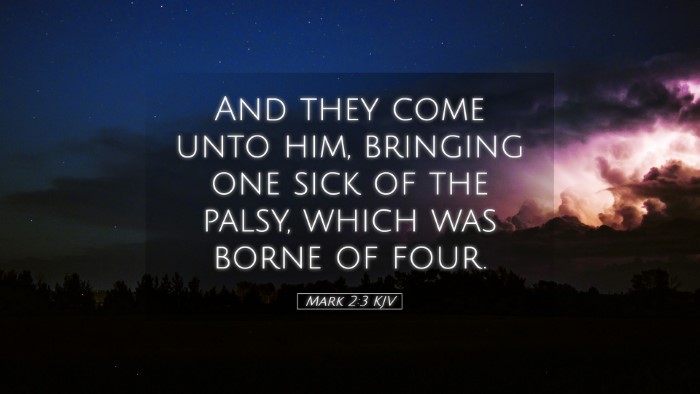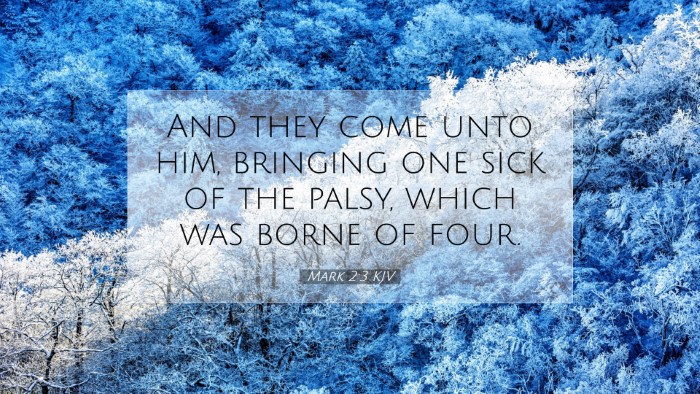Old Testament
Genesis Exodus Leviticus Numbers Deuteronomy Joshua Judges Ruth 1 Samuel 2 Samuel 1 Kings 2 Kings 1 Chronicles 2 Chronicles Ezra Nehemiah Esther Job Psalms Proverbs Ecclesiastes Song of Solomon Isaiah Jeremiah Lamentations Ezekiel Daniel Hosea Joel Amos Obadiah Jonah Micah Nahum Habakkuk Zephaniah Haggai Zechariah MalachiMark 2:3
Mark 2:3 KJV
And they come unto him, bringing one sick of the palsy, which was borne of four.
Mark 2:3 Bible Commentary
Commentary on Mark 2:3
Mark 2:3 states: "And they come unto him, bringing one sick of the palsy, which was borne of four." This verse depicts a significant moment in the ministry of Jesus, providing insight into faith, community, and the manifestation of divine power.
Contextual Background
This event occurs shortly after Jesus has begun His public ministry, drawing large crowds eager to hear His teachings and witness His miracles. The healing of the paralytic underscores the tension between Jesus' authority and the traditions of the religious leaders of the day.
Insights from Commentators
Matthew Henry's Commentary
Matthew Henry emphasizes the determination and faith of the friends of the paralytic. He notes that their collective effort to bring their friend to Jesus showcases the power of faith in action. Henry writes:
"They come unto him, bringing one sick of the palsy..." highlights the importance of community in the Christian faith. It serves as a reminder that we should support one another in seeking Christ.
Henry also observes that their approach reflects an understanding of Jesus’ authority to heal, revealing both desperation and hope. The manner in which they brought the paralytic indicates a proactive faith, one that is willing to overcome obstacles for the sake of the Gospel.
Albert Barnes' Notes on the Bible
Albert Barnes provides a detailed examination of the term "sick of the palsy," noting that it signifies a grave condition that rendered the individual unable to walk or perform basic functions. Barnes explains:
"The palsied man was entirely helpless, a picture of spiritual paralysis that afflicts many who remain distant from God."
He further reflects on the significant act of those who carried the man, emphasizing that it illustrates an essential principle of Christian fellowship—where one member bears the burden of another. Barnes concludes that the act of bringing someone to Jesus is a profound expression of love and commitment to one's neighbor.
Adam Clarke's Commentary
Adam Clarke sheds light on the cultural context of the time, noting that carrying someone who is paralyzed required substantial effort and cooperation. Clarke states:
"The four carriers are not only witnesses of the miracle, but also exemplars of faith and the spirit of unity."
In his commentary, Clarke emphasizes the spiritual implications of the act. He draws parallels between the physical healing of the paralytic and the spiritual restoration available to all who come to Christ. Clarke argues that the man’s condition reflects humanity's need for divine intervention and the importance of faith in the healing process.
Theological Implications
The act of bringing the paralytic to Jesus conveys several profound theological implications:
- The Role of Community: The friends of the paralytic exemplify the importance of Christian community. They embody the call to carry one another’s burdens, fulfilling Galatians 6:2.
- Faith in Action: The effort made to bring the man to Jesus illustrates a faith that acts. It is an invitation for believers to not only have faith but to actively engage in sharing that faith with others.
- Christ's Compassion and Power: This passage foreshadows the nature of Jesus' ministry—characterized by compassion and the power to heal. It reinforces the notion that Christ is the answer for the physical, emotional, and spiritual ailments that plague humanity.
Application for Today
Mark 2:3 invites readers to reflect on the following applications:
- Carrying Others to Christ: In today's world, Christians are called to actively seek out those who are spiritually or physically in need, much like the friends who carried the paralytic.
- Faithful Community: The strength of the church lies in its fellowship. Believers should come together in unity, supporting one another's spiritual journeys and burdens.
- Persistent Faith: Just as the four friends overcame obstacles to reach Jesus, modern believers are encouraged to exhibit persistence in prayer and action, trusting in God’s ability to intervene in difficult situations.
Conclusion
Mark 2:3 serves as a powerful reminder of the intersection of faith, community, and Christ’s healing power. The act of bringing the paralytic before Jesus highlights the necessity of both individual and collective faith as essential components of the Christian walk. This passage challenges believers to take responsibility for one another and to bring those in need to the feet of Jesus, who is ever able to heal, restore, and transform lives.


